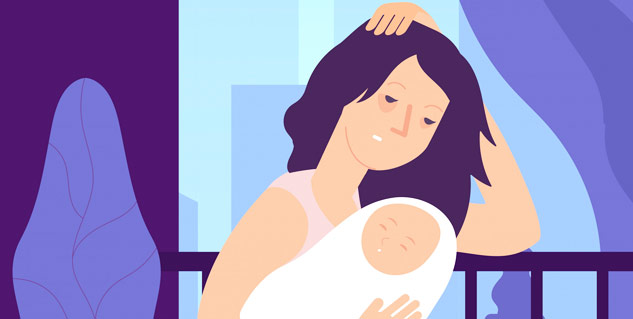Bringing a child into the world is often considered a joyous and life-changing experience. However, for some women, the postpartum period can be accompanied by a severe and rare psychiatric condition known as postpartum psychosis. Postpartum psychosis is characterized by a rapid onset of symptoms, often within the first two weeks after giving birth. This article aims to provide an in-depth understanding of postpartum psychosis by exploring its causes, symptoms, and available treatment options.
Causes of postpartum psychosis
- Hormonal factors
- Fluctuations in hormonal levels, particularly estrogen and progesterone, during pregnancy and childbirth have been linked to the development of postpartum psychosis.
- Sudden changes in these hormone levels can impact neurotransmitter activity, leading to psychiatric symptoms.
- Genetic predisposition
- Research suggests that genetic factors play a role in this disorder.
- Individuals with a personal or family history of mental health disorders, such as bipolar disorder or schizophrenia, may be more susceptible to developing postpartum psychosis.
- Sleep deprivation and stress
- The demanding nature of caring for a newborn, combined with the sleep deprivation experienced by new mothers, can contribute to the onset of postpartum psychosis.
- High levels of stress during the postpartum period can also trigger or exacerbate the condition.
Symptoms of postpartum psychosis
- Mood disturbances
- Severe and rapid mood swings, including mania, depression, or a combination of both.
- Agitation, irritability, and restlessness.
- Feelings of intense sadness, anxiety, or confusion.
- Cognitive and perceptual disturbances
- Disorientation, confusion, or difficulty concentrating.
- Intrusive and disturbing thoughts, often involving harm to oneself or the baby.
- Hallucinations or delusions, which may be related to the baby or other themes.
- Behavioral changes
- Insomnia or hyperactivity.
- Excessive energy and impulsivity.
- Social withdrawal or attempts to harm oneself or the baby.
Treatment of postpartum psychosis
- Hospitalization and safety measures
- In most cases, immediate hospitalization is necessary to ensure the safety of both the mother and the baby.
- A secure and supportive environment is provided to monitor the mother’s condition and prevent any harm.
- Medication
- Antipsychotic medication is commonly prescribed to stabilize mood and reduce symptoms.
- Mood stabilizers or antidepressants may also be used depending on the individual’s specific symptoms and medical history.
- Psychotherapy and supportive interventions
- Individual and group therapy sessions can provide emotional support, coping strategies, and a safe space to express feelings.
- Support from family members, friends, and support groups is crucial in the recovery process.
- Electroconvulsive therapy (ECT)
- In severe cases where symptoms do not improve with medication or when the mother cannot tolerate medication due to breastfeeding or other factors, ECT may be considered.
- ECT involves passing electric currents through the brain to induce a controlled seizure, which can help alleviate symptoms.
Long-term outlook and prevention strategies
- Recurrence risk and planning for future pregnancies
- Women who have experienced postpartum psychosis have a higher risk of recurrence in subsequent pregnancies.
- Collaborative decision-making involving the mother, her healthcare provider, and mental health specialists is crucial when considering future pregnancies.
- Education and early detection
- Educating healthcare providers, new mothers, and their families about the signs and symptoms of postpartum psychosis can lead to earlier detection and intervention.
- Regular mental health screenings during prenatal and postpartum check-ups can aid in early identification.
- Supportive postpartum care
- Adequate social support, including help with childcare and household responsibilities, can alleviate stress and reduce the risk of this disorder.
- Encouraging open communication and providing access to mental health resources can also contribute to a supportive postpartum environment.
Conclusion
Postpartum psychosis is a complex and challenging condition that requires immediate attention and intervention. Understanding its causes, recognizing the symptoms, and ensuring proper treatment are vital to the well-being of both the mother and the baby. By raising awareness, providing support, and implementing preventive measures, we can work towards reducing the impact of postpartum psychosis and improving the lives of those affected by this condition.





